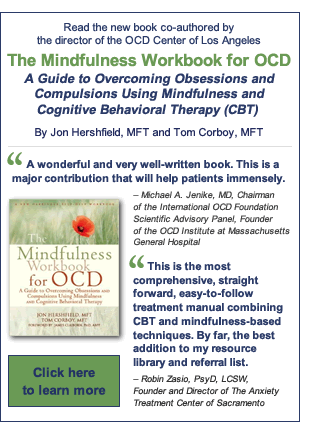There is an excellent article in this week’s Newsweek (October 12, 2009 – available on newsstands October 6th) about the failure of psychotherapists to use treatments that have been shown to be effective. The author of the article, Sharon Begley, points out that many therapists follow a treatment approach that is based not on science, but on their personal preference and experience with past clients.
This article is right on target.
As a center specializing in the Cognitive-Behavioral Therapy (CBT) for the treatment of OCD and related anxiety disorders, our therapists see this problem on a regular basis. There is extensive research showing that the most effective treatment for OCD is a very specific set of CBT techniques. And when I say extensive research, I mean numerous controlled research studies going back 20 years. Our treatment program focuses entirely on CBT not because of some arbitrary preference but because it is what scientific research has shown to be the most effective means of alleviating our clients’ difficulties.
Despite this fact, I receive calls on a regular basis from new clients who have had years of ineffective treatment that seems to have been based on their therapists beliefs rather than on scientific research. I have had clients tell me about years of experience with Freudian analysis, Gestalt therapy, EMDR, NLP, hypnosis, herbs, supplements and good old fashioned “talk therapy”. The problem is that none of this works for OCD or related anxiety disorders! What works for OCD has been established, yet it seems that most therapists simply don’t care – they learned how to do therapy a certain way, they believe it is the right way, and they subject their clients to that method, with no apparent interest in learning what would actually work.
 In fairness to other therapists, it is worth noting that the problem originates with graduate schools. Most simply do not teach the specific techniques needed to effectively treat OCD and other anxiety disorders. When I was in graduate school in the early 1990s, I was amazed by how little time was spent discussing OCD – about five minutes! I am not making this up. The simple truth is that the great majority of therapists don’t appropriately treat people with OCD and related anxiety disorders because they are not trained properly.
In fairness to other therapists, it is worth noting that the problem originates with graduate schools. Most simply do not teach the specific techniques needed to effectively treat OCD and other anxiety disorders. When I was in graduate school in the early 1990s, I was amazed by how little time was spent discussing OCD – about five minutes! I am not making this up. The simple truth is that the great majority of therapists don’t appropriately treat people with OCD and related anxiety disorders because they are not trained properly.
One thing the Newsweek article got wrong was its report that this problem is “less true of psychiatrists, since M.D.s receive extensive scientific training”. My experience has been that many psychiatrists have no interest in learning about therapy at all, and solely want to use medication to treat OCD and other anxiety disorders. In fact, until just a few years ago, psychiatric training programs were not even required to offer coursework in counseling. Psychiatrists could graduate and become psychiatrists with no formal training in providing counseling of any sort. Countless times I have heard from new clients that their psychiatrists have told them that there is nothing that can be done for OCD except to take medication. In one case, I had a client whose psychiatrist told him that CBT was a waste of time and simply didn’t work for OCD. I wasn’t surprised when that psychiatrist then referred the client to his wife, a Freudian analyst (again, I am not making this up).
Begley’s article quotes a recent editorial by Walter Mischel of Columbia University, who noted that “the disconnect between what clinicians do and what science has discovered is an unconscionable embarrassment”, and added that he was concerned that the field of psychology will “discredit and marginalize itself” if it doesn’t pay more attention to evidence-based treatments. I couldn’t agree more. It is imperative that psychotherapists treat their clients with treatments that are supported by evidence rather subjective beliefs. To do anything less is unethical.
•Tom Corboy, MFT, is the director of the OCD Center of Los Angeles, a private, outpatient clinic specializing in Cognitive-Behavioral Therapy (CBT) for the treatment of Obsessive-Compulsive Disorder (OCD) and related conditions. In addition to individual therapy, the center offers six weekly therapy groups, as well as online therapy, telephone therapy, and intensive outpatient treatment. To contact the OCD Center of Los Angeles, click here.




























































